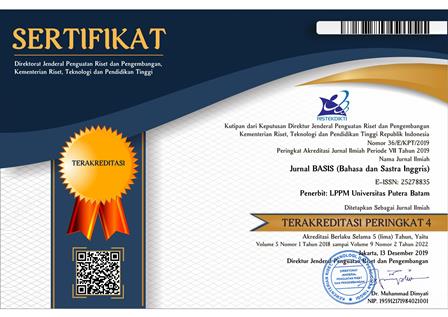THE MODEL OF PROJECT-BASED AND COGNITIVE COMPETENCIES-INFUSED LEARNING IN THE GRAMMAR CLASS OF ELESP
MODEL OF PROJECT-BASED AND COGNITIVE COMPETENCIES-INFUSED LEARNING IN THE GRAMMAR CLASS OF ELESP
DOI:
https://doi.org/10.33884/basisupb.v9i1.4619Keywords:
model of learning, project-based learning, cognitive competencies, grammarAbstract
Model of learning is a guideline that teachers will use to let their teaching more comprehensive and practical to facilitate the achievement of the learning goal. A dynamic approach suited to teaching in which students explore real-world problems and challenges, simultaneously developing 21st-century skills while working in small collaborative groups is Project-Based Learning. The purpose of the study is to analyze the used model of Project-Based and Cognitive competencies-infused learning in the grammar class of English Language Education Study Program. This study employed a qualitative design where the data are the components of the existing models of learning in grammar classes of English Language Education Study Program. Besides, online class observation and grammar class syllabus documents are used as instruments. The findings of analysis revealed that Methods that generally used in the online class observation are Computer-Assisted Instruction (CAI), Scaffolding, Reciprocal method, Cooperative Learning while mostly used Lecturing, General Discussion, and Presentation to delivering material. The indicator that could be seen in syllabus document and class observations was Critical Thinking from Cognitive competences indicators. The Project-Based Learning indicators could also be seen directly from syllabus documents and online class observations. Intellectual Challenge and Accomplishment was mostly dominated seen in the model.
References
Anthony, Edward M. 1963. “Approach, Method, and Technique. English Learning.” 17: 63-67 .
Asyafah, Abas. 2019. “Menimbang Model Pembelajaran (Kajian Teoretis-Kritis Atas Model Pembelajaran Dalam Pendidikan Islam).” TARBAWY : Indonesian Journal of Islamic Education 6(1):19–32. doi: 10.17509/t.v6i1.20569.
Behar-Horenstein, Linda S., and Denise M. Seabert. 2012. “Teachers’ Use of Models of Teaching.” Educational Practice and Theory 27(1):49–66. doi: 10.7459/ept/27.1.04.
Billah, Arif, Uswatun Khasanah, and Sri Widoretno. 2019. “Empowering Higher-Order Thinking through Project-Based Learning: A Conceptual Framework.” AIP Conference Proceedings 2194(December). doi: 10.1063/1.5139743.
Brown, H. Douglas. 2000. Principles of Language Learning and Teaching. Vol. 57.
Brown, H. Douglas. 2007. Principle of Language Learning and Teaching.
Buck Institute for Education. 2019. “PBL Handbooks: Creating Projects to Ignite Learning for Every Student.” 1–25.
Budgen, Roy van den Brink. 2007. “Critical Thinking for A2.”
Butterworth J., Thwaites G. 2013. Thinking Skills Critical Thinking and Problem Solving. Vol. second edi.
Carson, Jamin. 2007. “A Problem With Problem Solving: Teaching Thinking Without Teaching Knowledge.” Mathematics Educator 17(2):7–14.
Chikita, GP, Ni Nyoman, and I. Wayan. 2013. “The Effect of Project Based Learning (PBL) and Students’ Perceived Learning Discipline Toward the Writing Competency of the Eleventh Grade Students of Sman 5 Mataram in the Academic Year 2012/2013.” 1.
Cruickshank, Donald R., Deborah Bainer Jenkins, and Kim K. .. Metcalf. 2006. The Act of Teaching Teaching. 4th ed. Boston : McGraw-Hill Higher Education.
Dostál, Jiří. 2015. “Theory of Problem Solving.” Procedia - Social and Behavioral Sciences 174(February):2798–2805. doi: 10.1016/j.sbspro.2015.01.970.
Eggen, Paul, and Don Kauchak. 2012. “Strategies and Models for Teachers.” Pearson 72(508):343.
Firdaus, Firdaus, Ismail Kailani, Md. Nor Bin Bakar, and Bakry Bakry. 2015. “Developing Critical Thinking Skills of Students in Mathematics Learning.” Journal of Education and Learning (EduLearn) 9(3):226–36. doi: 10.11591/edulearn.v9i3.1830.
Freeley, Austin J., and David L. Steinberg. 2009. Argumentation and Debate: Critical Thinking for Reasoned Decision Making. Vol. 89. twelfth ed.
Gerot, L., and P. Wignell. 2010. Making Sense of Functional Grammar: An Introductory Workbook. Cammeray, Australia: Gerd Stebler.
Guo, Pengyue, Nadira Saab, Lysanne S. Post, and Wilfried Admiraal. 2020. “A Review of Project-Based Learning in Higher Education : Student Outcomes and Measures.” International Journal of Educational Research 102(May):101586. doi: 10.1016/j.ijer.2020.101586.
Harmer, Jeremy. 2011. The Practice of English Language Teaching. Vol. 24. fourth. Essex England: Longman.
High Quality Project Based Learning. 2017. “Framework for High Quality Project Based Learning.” 1–6.
Hong, Lee, and Sharon Yam. 2010. “Implementing a Project-Based Learning Approach in an Introductory Property Course.” (January):1–19.
Hudson, Richard. 2005. “The English Patient : English Grammar and Teaching in the Twentieth Century 1.” 41:593–622. doi: 10.1017/S0022226705003464.
J. Stivers, and Godman. Brandon. 2010. “Project-Based Learning Why Use It?” 1–39.
Joyce, Bruce, Marsha Weil, and Emily Calhoun. 2015. Models of Teaching Ninth Edition. Vol. 9th. ISBN 978- 0- 13- 374930-.
Jumaat, Nurul Farhana, Zaidatun Tasir, Noor Dayana Abd Halim, and Zakiah Mohamad Ashari. 2017. “Project-Based Learning from Constructivism Point of View.” Advanced Science Letters 23(8):7904–6. doi: 10.1166/asl.2017.9605.
Jusmaya, Ance, and Winda Efyanto. 2018. “Meningkatkan Kemampuan Critical Thinking Mahasiswa Dengan MenerapkanProject Based Learning.” Jurnal Pendidikan Bahasa, Sastra, Dan Seni 19(2):116–27. doi: 10.24036/komposisi.v19i2.100657.
Kaunang, Chrisce Juonata. 2018. “Using Project-Based Learning in Enhancing Students’ Speaking Skill at SMA PSKD 7.” JET (Journal of English Teaching) 3(2):119. doi: 10.33541/jet.v3i2.704.
Keck, Casey, and YouJin Kim. 2014. Pedagogical Grammar. Amsterdam; Philadelphia: John Benjamins Publishing Company.
Kim, Sharon, Mahjabeen Raza, and Edward Seidman. 2019. “Improving 21st-Century Teaching Skills: The Key to Effective 21st-Century Learners.” Research in Comparative and International Education 14(1):99–117. doi: 10.1177/1745499919829214.
Koenig, Judith Anderson. 2011. “Assessing 21st Century Skills: Summary of a Workshop.” The National Academies Press.
Kornwipa Poonpon. 2017. “Enhancing English Skills Through Project-Based Learning.” The English Teacher XL(October):1–10.
Kusdinar, Uus, Sukestiyarno Sukestiyarno, Isnarto Isnarto, and Afit Istiandaru. 2017. “Krulik and Rudnik Model Heuristic Strategy in Mathematics Problem Solving.” International Journal on Emerging Mathematics Education 1(2):205. doi: 10.12928/ijeme.v1i2.5708.
Lai, Percy, and Yin Kwok. 2004. “Scaffolding Supports in Project-Based Learning through Knowledge Community ( KC ): Collaborative Learning Strategies and Pedagogical Facilitation.” 1–13.
Laia, Septe Albert, and Ifan Iskandar. 2020. “Designing Ways of Thinking Skills - Integrated Writing Syllabuses for English Language Education Study Program.” 9(May).
Larsen-Freeman, Diane, and Marianne Celce-Murcia. 2016. “The Grammar Book: Form, Meaning, and Use for English Language Teachers Third Edition.” 900.
Luna, Cynthia. 2015. “The Futures of Learning 2: What Kind of Learning for The 21st Century?” Education Research and Foresight 1–14.
Mislena, Erlina, and Hesti Wahyuni Anggraini. 2020. “The Application of Project-Based Learning (PBL) Through Storyboard to Improve Reading Achievement of the 10th Grade Students.” 513:395–401. doi: 10.2991/assehr.k.201230.136.
Moore, Brooke Noel, and Richard Parker. 2009. Critical Thinking Highlights of the Ninth Edition.
Nurcahyoko, Kunto. 2014. “Project-Based Learning in Teaching Grammar for High And Low Motivated Students (The Case of The Tenth Graders of Sman 1 Bangsri In The Academic Year of 2013/2014).” English Education Journal 4(2):138–44.
NYSUT. 2015. “Critical Thinking and Problem-Solving for 21st Century Learner.” Educator’s Voice 8:117.
OECD. 2018. “The OECD PISA Global Competence Framework: Preparing Our Youth for an Inclusive and Sustainable World.” Oecd 43.
Pallavi, Swarnika. 2006. “Problem Solving Method.”
Pisa. 2012. PISA 2012 Results : Creative Problem Solving. Vol. V.
Purnawati, and Iskandar. 2019. “Designing ICT Competences-Integrated Syllabuses of Grammar Courses for English Language Education Study Program.” Ijlecr - International Journal of Language Education and Culture Review 5(2):104–15. doi: 10.21009/ijlecr.052.12.
Putri, Sri Wathani. 2018. “The Effect of Project Based Learning Implementation on Students’ Participation and Achievement in English Speaking Course.”
Rama, José López, and Gloria Luque Agulló. 2012. “The Role of the Grammar Teaching: From Communicative Approaches to the Common European Framework of Reference for Languages.” Revista de Lingüística y Lenguas Aplicadas 7(1):179–192.
Richards, Jack C., and Theodore S. Rogers. 1986. “Approaches and Methods in Language Teaching.” The Canadian Modern Language Review 44(3):551–551. doi: 10.3138/cmlr.44.3.551.
Saavedra, Anna Rosefsky, The Rand Corporation, V. Darleen Opfer, The Rand Corporation, Tony Jackson, Jessica Kehayes, Jennifer Li, and David Perkins. 2012. “21.Century Skills.” (April):1–35.
Sari, Dian Permata. 2016. “An Analysis of Students’ Reading Comprehension Based on The Four Levels Comprehension.” Journal of Linguistics and Language Teaching 3(1):1–20.
Seymour, Jennifer R., and Helena P. Osana. 2003. “Reciprocal Teaching Procedures and Principles : Two Teachers ’ Developing Understanding.” 19:325–44. doi: 10.1016/S0742-051X(03)00018-0.
Shin, Myeong-hee. 2018. “Effects of Project-Based Learning on Students ’ Motivation and Self-Efficacy.” 73(1):95–114. doi: 10.15858/engtea.73.1.201803.95.
Sun, Rachel C. F., and Eadaoin K. P. Hui. 2012. “Cognitive Competence as a Positive Youth Development Construct: A Conceptual Review.” The Scientific World Journal 2012:21–23. doi: 10.1100/2012/210953.
Turpin, S. .. M., and M. A. Marias. 2004. “Decision-Making : Theory and Practice.” Decision-Making: Theory and Practice 20(2):143–60.
Wilson, Suzanne M., and Penelope L. Peterson. 2006. “Theories of Learning and Teaching.” Caring for Patients, Caring for Student Nurses (July):4–31. doi: 10.4324/9780429459610-2.

















